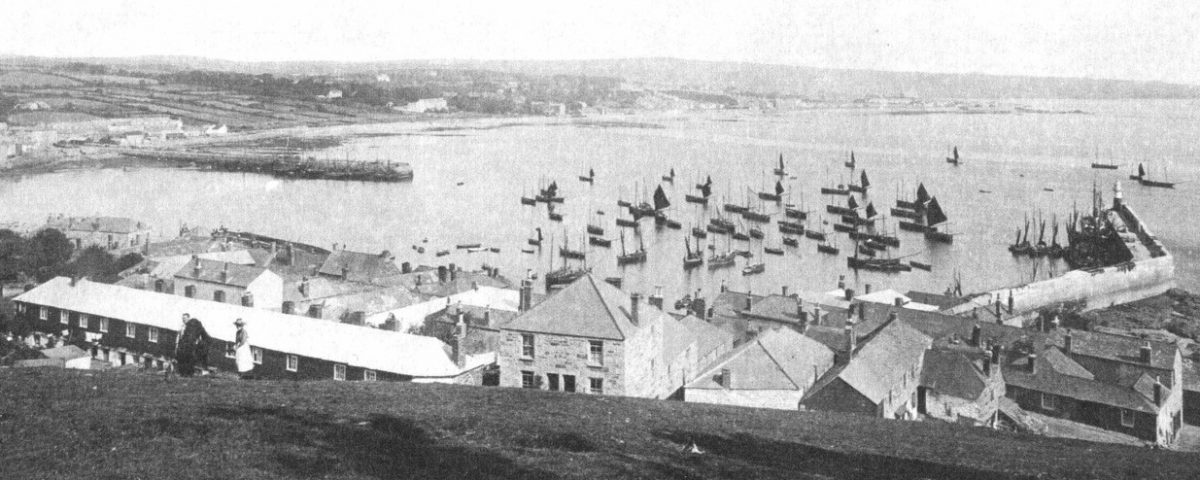Edith & Ethel ~ PZ.361 1888-1914.
Edith & Ethel ~ LT.320 1914-1924.
Edith & Ethel ~ PH.14 1924-1931.
Edith & Ethel ~ PZ.361.
Built at Newlyn in 1887-8 for owner/skipper, Thomas Reynolds, she fished out of Newlyn until 1904. Family tradition has it that she was ‘one of ours,’ but no Pawlyn was ever recorded as an owner while she was registered at Penzance. Thus, I presumed that the family interest in this lugger must have been as fish-buyers, probably by way of an unsecured loan to Thomas Reynolds – a common enough practice. Nevertheless, the more I looked into her later career, the more I think the Pawlyn family interest may have stemmed from the time she was sailing under Lowestoft and Plymouth markings as a herring driver-cum-trawler, but again none of the family appear to have been amongst her registered owners.
On June 14th, 1888, the new first-class Mount’s Bay lugger Edith and Ethel, was registered at Penzance, and allocated the port fishing number PZ.361. Built in Newlyn, her builder’s name was not recorded in the official records, but the new boat was mentioned in passing soon after she was put in hand – if not then named. –
NEWLYN.
BOATBUILDING AT NEWLYN. – Messrs. R. Warren and Son, boat-builders, Newlyn, are now engaged in the construction of a first-class boat of 46 feet keel. This fine craft will take the place of the veteran – the Elsie Kerr [47.PZ], and is the property of Mr. Thomas Reynolds, of Newlyn.[1]
Cornishman, Thursday, October 13th, 1887
Building completion took a little over six-months, and unfortunately no report of her launch has been discovered, but she was registered as a British Sea Fishing Boat, at the Penzance Custom House, with the name Edith & Ethel, on June 14th, 1888. She was a fine, first-class lugger, of 20.76 tons by measurement, of the type known as a ‘mackerel-driver’ in local parlance.1 Working drift nets, with a crew of six men and a boy, her owner-skipper was Newlyn fisherman Thomas Reynolds, who would then have been about 47 years of age.
Family names for new boats were quite popular, and she was named after Thomas’s two unmarried daughters, Edith (22) and Ethel (20).
While Thomas remained her sole owner until 1913, a John Reynolds [possibly a nephew], was endorsed as skipper on July 18th, 1890, just after the close of her second home mackerel season. He only held command for a few seasons, as in December 1892, Thomas Reynolds was skipper once more.
Thomas Reynolds and his family resided in Fore Street, Newlyn. That is the road running along the Cliff, from the Norr’ard slip toward Mousehole. So, it is not surprising that when in harbour, she was moored as close to the foot of that slip as possible, and there we find her in a badly exposed photo from the 1890s.
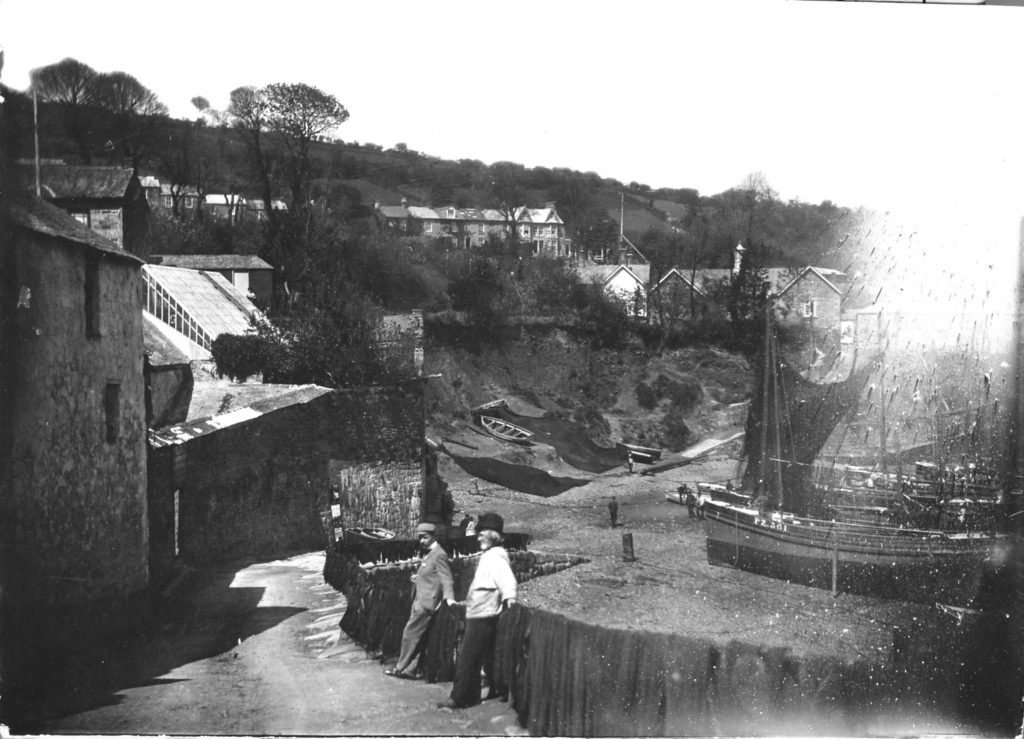
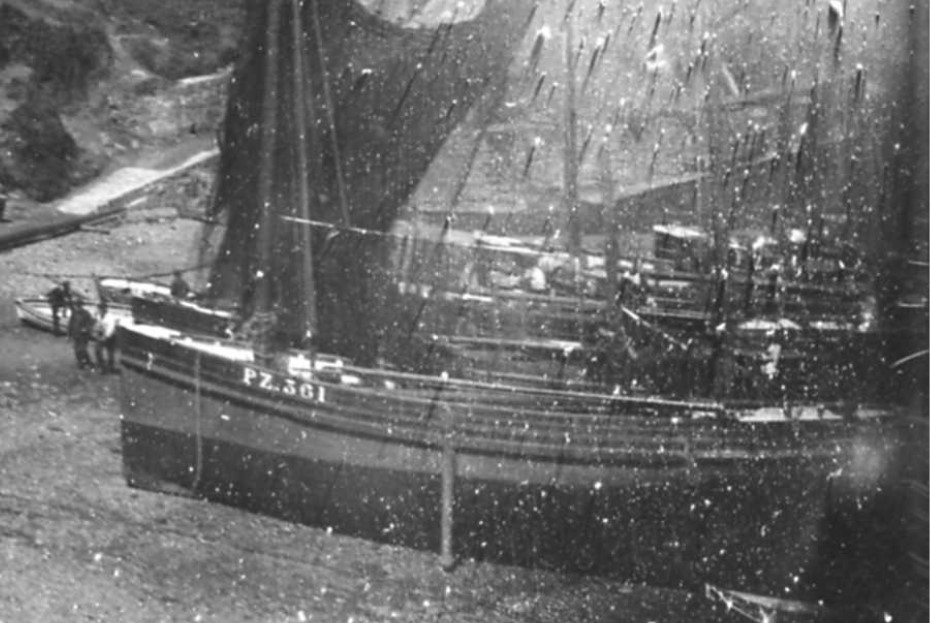
In a somewhat better photo of three luggers fitting out on the beach between the two slips, she lies, partly obscured behind the others – but her fishing number is clear to see.
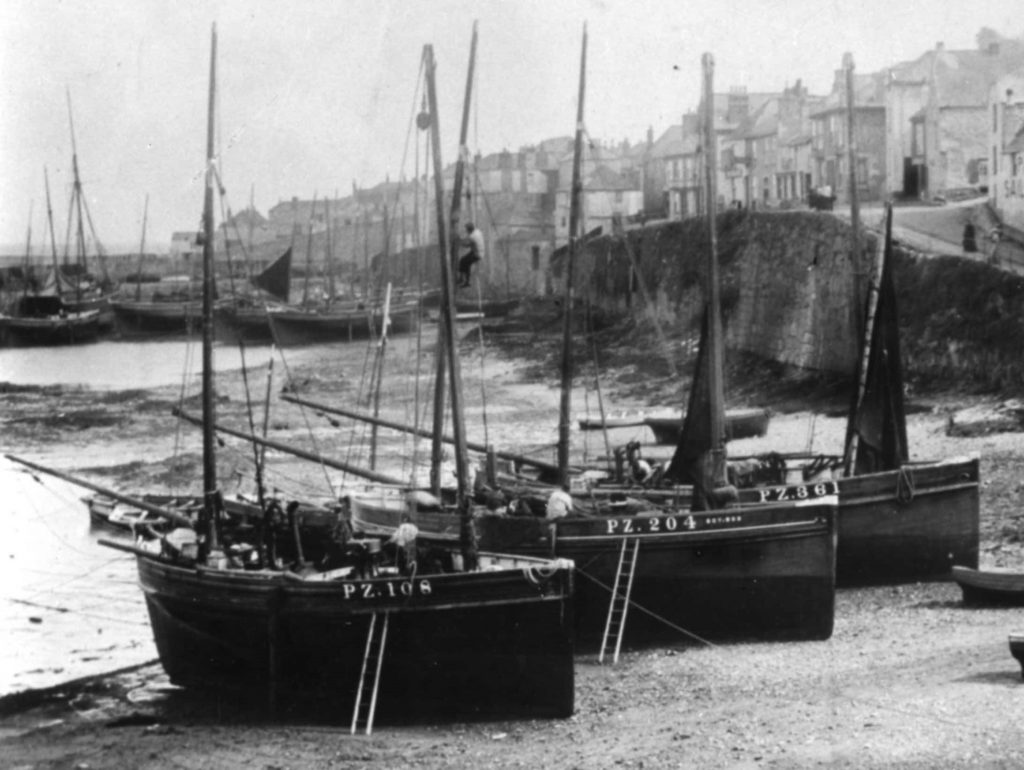
PZ.108 ~ Bessie, PZ.204 ~ Boy Bob, and PZ.361~ Edith & Ethel.
Significantly lacking reports of her fishing progress during her first decade, we can only assume that she followed the normal cycle of mackerel and herring fisheries, wherever skipper Reynolds though best to try his luck, season by season.
It was not until the winter herring fishery of 1897, that the Edith and Ethel got her first mention in the local newspapers.
NEWLYN,
On Thursday about 30 boats returned from Plymouth, where they have been engaged on the mackerel fishery. They will remain at home till the next darks. The fishing at Plymouth has not been any good as yet, but better hopes are entertained for this month. Some of the boats had a bad night out on Wednesday coming from Plymouth; but by good management, were brought safely home to Newlyn. The herring boats do not come home. On Friday there was a very large number of herrings; about 50 boats bringing in from four lasts to a last and a half apiece. But the price was very poor, being only 11d. to 1s 2d. per 120, instead of the 5s. to 5s. 8d. given on Thursday. The Edith and Ethel was the boat lucky enough to obtain the largest catch.
Cornishman, Thursday, December 9th, 1897
As well as the fairly predictable seasonal variations of the fisheries each year, there were also longer-term periodic variations in the different fisheries over the years. These were entirely unpredictable. Some variation was undoubtedly caused by over fishing in some years, but other variations in the temperature of the sea caused shoals of fish gather in different parts of the coastal waters. Fish responded to quite subtle variations in the temperature of the seas around the British Isles, and this was particularly so in the water off Cornwall, occasioned by deviations in the North Atlantic drift – the warm Gull Stream current. Pilchard and herring were particularly water temperature sensitive, the pilchards proffering it a little warmer, while the herring preferred it a little cooler – but only marginally so. This resulted in notable years when the autumn pilchards and autumn herring shoaled close together off the North coast of Cornwall. Such seasonal variations could result in feast and famine years.
NEWLYN.
The Edith and Ethel arrived from Ireland a few days ago, having unsuccessfully fished the water off Howth for herrings for a fortnight. Irish herring seasons seem to be played out.
We regret to hear that Newlyn fishermen who prosecute the herring fishery in the North Sea, from Sunderland to Whitby, find few herrings, and they are of indifferent quality.
MOUSEHOLE
The fishing boats from Mousehole which had tried Dublin Bay for herrings have met with no success whatever. From Howth they have proceeded to Ardglass, where we learn they are equally unsuccessful; yet, a comparatively few years ago, the Irish herring fishery was an excellent thing and St. Ives and Mount’s Bay men earned a lot of money in the Emerald Isle.
Cornishman, Thursday, July 27th, 1899
But then all went quiet for several years, and when we next hear of the Edith and Ethel, her crew were suffering. There were no effective protective gloves in this era, and hauling saturated nets hand over hand was strenuous enough, without minute pieces of broken spines and spurs embedded in the twine of the nets.
NEWLYN NOTES AND NEWS.
Probably never have so many fishermen been suffering from gathered and poisoned hands during the mackerel season as they have this year. The wounds were caused by the spurs on the numerous scads and dog-fish caught in the mackerel nets. In almost every boat there have been men with more or less injured hands, while many luggers have had at least one of the crew ashore laid up with poisoned hands and fingers. The crew of the Edith and Ethel have suffered as badly as any craft, the lugger having been worked shorthanded for weeks, one of her men still being unable to resume work.
Cornishman, Thursday, July 18th, 1907
The fishing community was a tight one, with relatively long-term stability amongst the crews, many of whom also supplied the fishing-nets for each boat, as well as their labour.
NEWLYN NOTES AND NEWS.
The Newlyn lugger Edith and Ethel that left on Monday morning with her summer mackerel nets on board, for the deep sea fishery had half her train of nets cut away the same night by a steamer. Search has since been made for the nets, but no trace of them has yet been discovered.
Cornishman, Thursday, May, 14th, 1908
NEWLYN NOTES AND NEWS.
The half-train of summer mackerel nets cut away from the Newlyn lugger Edith and Ethel by a large steamer nine miles west of the Bishop a fortnight ago were picked up in Crow Sound, St. Mary’s, Scilly, last week by the lugger Vesta, Capt. Ladner, of Mousehole. The nets, which were without footline, were in one tangled heap and damaged almost beyond repair. They were brought to Newlyn on Saturday, when only one fairly sound net was taken from the mass.
Cornishman, Thursday, May, 21st, 1908
NEWLYN.
On Wednesday night the Newlyn luggers Our Lizzie, Edith and Ethel, Emily, Bessie, and Martha Jane arrived home, after fishing from Plymouth with herring nets for more than three weeks, and meeting with a very scanty measure of success. One of these boats secured 10,000 from one night’s fishing, but it was the only shot of any note taken by the Newlyn herring drifters in Plymouth waters. A couple of Newlyn luggers are still pursuing the herring fishery from Plymouth.
A few large Pollack are being landed from the Mount’s Bay herring drivers. These are caught by the crews with hook and line after the herring nets have been shot. The find a ready sale at from 1s to 3s each, according to size. From the same source on Wednesday night there were some good landings of hook whiting, one herring driver having 17 score. Prices ranged from 2s 6d to 3s 6d per score.
It would appear that by this time the weight of competition from the east coast steam drifters was enough to persuade Thomas Reynolds to abandon the home mackerel fishery in 1910, and try his luck working a beam-trawl. This was a quite unusual venture for a lug-rigged vessel, of Mount’s Bay lines. Their fine lines aft tending to allow them to squat down in the water when dragging a weighty trawl astern. In addition, the inshore grounds around Mount’s Bay were littered with abandoned anchors and cables, and numerous pieces of uncharted wreck – not that many of the Mount’s Bay boats carried charts as such, but the fishermen knew where they were by lines of sight, bearings off the land, and the run of the sea.
NEWLYN NOTES AND NEWS.
While trawling on the Carvilles ground in Mount’s Bay on Friday, the Newlyn lugger Edith and Ethel lost the whole of her gear in the inner part of the ground, the trawl having got fast in some wreckage. The gear has not yet been recovered.
Cornishman, Thursday, March 17th, 1910
NEWLYN NOTES AND NEWS.
The Newlyn lugger Edith and Ethel, that lost her trawl while fishing in the Carvilles ground as few days ago, again pout off on Saturday with her own crew and other hands who had volunteered their services in another search for the lost trawl and gear, but unfortunately no trace of then whatever was discovered.
Cornishman, Thursday, March 31st, 1910
Although Newlyn harbour was a relatively secure haven it had one design fault in that the head of the South Pier terminated directly opposite the head of the North pier, with no overlapping protection of the harbour mouth. This was fine in normally prevailing weather conditions, but whenever a gale sprung up from a south-easterly quarter, breakers swept past the harbour mouth, and an aggressive run could build up inside, along the North pier, where many of the boats moored. To reduce the risk many skippers moored their boats, bows seawards, across the harbour, well clear of the piers. Which was fine so long as your moorings held.
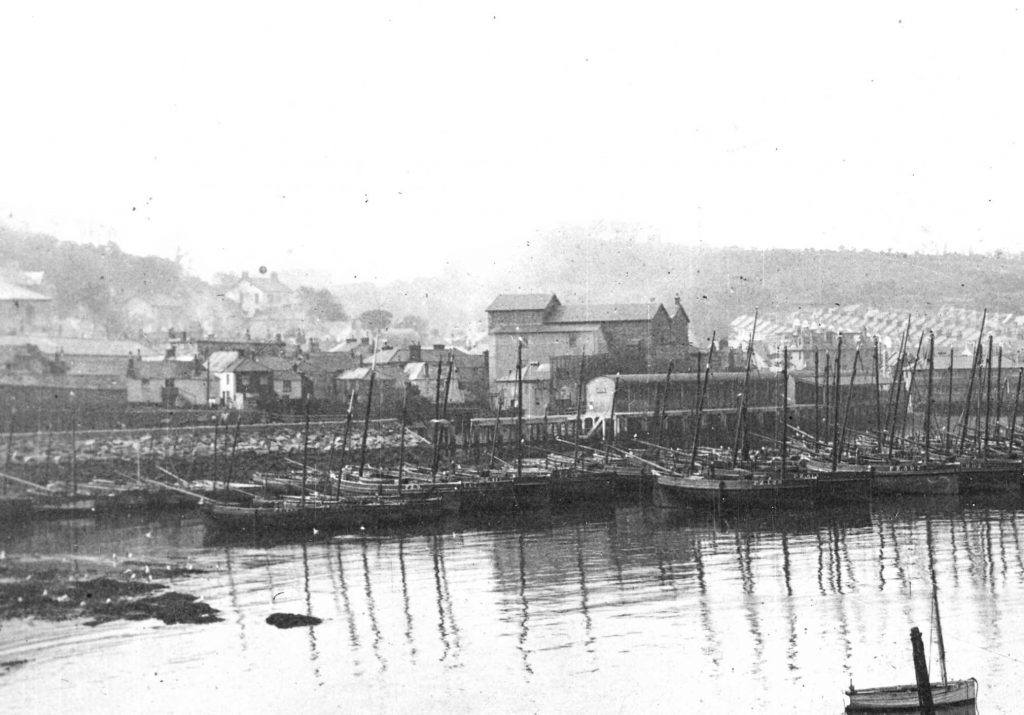
Such storm conditions prevailed in mid December 1910.
NEWLYN.
The heavy gale which raged on Wednesday caused extensive damage to the fishing fleet in Newlyn Harbour. The “run” in the water was so great that several boats broke adrift from their moorings, and the fishermen had an anxious time, several remaining on their craft during the night.
The South Pier was, during the day, swept by heavy seas, and large granite stones put there for shipment, were washed over into the harbour.
Owing to the force of the tide near the harbour mouth, the Yarmouth steam drifter Lloyd George and a steam trawler were unable to enter, and put out again into the Bay.
The pilchard boat Ark (owned by Mr. Isaac Francis), broke adrift from her moorings and drifted to the rocks on the side of the harbour road. Holes were made in the port and starboard sides, but willing helpers were soon on the scene, and the craft was removed to a place of safety.
The Gertie (owner by Mr. John Leah) also parted her moorings, and went on the rocks. The bottom of the boat is so badly damaged, that it is doubtful if she will ever be sea-worthy again.
At the Old Pier [normally a very secure berth], conditions were so bad that several larger boats, the Ross, Bessie, We’ll Try, Britannia, and Chancellor broke adrift, and but for the prompt action of the men, the damage would have been more serious.
The Children’s Friend, lying alongside the North pier, received damage to [her] bend; the Breadwinner (on moorings) also received slight damage. The Thomas Harvey and Temperance Star received damage to their stems. The Edith and Ethel also broke adrift from her moorings, but happily was secured before further damage occurred.[10]
Cornishman, Thursday, December 15th, 1910.
Whatever damage was sustained by the Edith and Ethel, it cannot have been serious, as she was soon engaged in the Plymouth winter herring fishery.
NEWLYN NOTES AND NEWS.
Three boats put to sea on Monday morning but were unsuccessful, one boat only having one hundred herrings. News being received at Newlyn on Monday of good fishing at Plymouth, the Martha Jane, Our Lizzie, Emily, Paragon, Edith and Ethel, and Boy Bob left immediately for that port. The remainder of the local fleet left on Tuesday.
Cornishman, Thursday, December 29th, 1910
Very occasionally there are more revealing reports about social conditions and the personal circumstances of individual fishermen. On January 8th, 1913, ownership of the Edith and Ethel was transferred to Thomas Reynolds Junr, of Higher Green St., Newlyn. This was claimed to have been a slightly coloured transaction when Thomas Reynolds senior was prosecuted over a false claim for an Old Age Pension, later that year.
NEWLYN MAN AND THE OLD AGE PENSION.
FINE IMPOSED BY PENZANCE MAGISTRATES.
At Penzance Guildhall on Wednesday morning, before the West Penwith magistrates, with Mr. N. T. Williams in the chair.
Thomas Reynolds, sen., of North Corner, Newlyn, was summoned for endeavouring to obtaining [sic] an Old Age Pension for himself knowingly making certain false representations that since he had first applied for an Old Age Pension, he had spent £50 on a new boiler and nets for the larger of his two boats, and the £200 which he had given to his children to go to America and to support their families in the time of need ever since
The prosecution alleged that this was false, and that since he had applied for an Old Age Pension he had not spent £50 on a new boiler and the nets and the sum which he had given to his children was not given to enable them to go to America and to support their families in time of need; inasmuch as the new boiler was supplied to the larger boat and paid for before the first claim for an Old Age Pension, and the £255 which he had had at the bank he had transferred into the names of his two sons Henry James Reynolds and Edward Reynolds on the 1st Match, 1913, in order that he (Thomas Reynolds) might qualify for an Old Age Pension.
Mr. J. Vivian Thomas appeared for defendant, and entered a plea of not guilty.
Mr. C. E. Fitz Roy, of the solicitor’s department, H. M. Customs and Excise, London, prosecuted.
Mr. Fitz Roy said the proceedings were taken under section 9 of the Old Age Pension s Act, which provided for the imposition of a penalty of six months’ hard labour on any person knowingly making a false representation for the purpose of obtaining an Old Age Pension either for himself or any other person, and as an alternative a fine not exceeding £25.
Proceeding, he said defendant was 71 years of age and in March of last year, he made a claim for an Old Age Pension. This was duly investigated by Mr. Miller, the pension officer for the district, who ascertained from defendant that he had £250 on deposit in Messrs. Barclay’s bank ay Penzance, that he owned the house he lived in at Newlyn, had two fishing boats, the Edith and Ethel, and Mary, and his means for the purposes of the Old Age Pension were assessed at over £40. His claim was considered by the local pensions committee and disallowed. Defendant appealed to the Local Government Board who considered the mater and disallowed the pension. Replying to a question on the prescribed form, as to how much money he had coming in per week, the defendant replied “Nothing.” To the question “What other means of subsistence have you?” defendant replied “nil.” The pension officer wrote stating that this could not be the case, as he could not possibly live on nothing, and asked him to correct these answers. He further called attention to the details he had supplied as to his means when he sent in his application. On June 3rd, when Mr. Miller received the following letter from defendant: –
Since I first applied, I have spent £50 on a new boiler for the larger of my two boats. My two sons could not get a crew to put her to sea and she is now lying in Newlyn harbour. The £200 I had I gave to my children to go to America and to support their families in time of need ever since. Seeing that the two boats were of no use to me and only keeping me poor, I gave them to my eldest son and they are no use to him. He is gone to Southampton to try to get a berth there in order to try to get a living for his family. All that he had earned for three months before last Christmas was 7s., and all that I received was 13s 6d.
The letter bore the mark of Thomas Reynolds, and was written and witnesses by James White.
That letter said Mr. Fitz Roy, formed the basis of their summons. The officer called to see defendant on 7th June and took with him the claim, the two letters defendant had written, and his original letter, showed them to Mr. Reynolds, and read them over to him, and he said they were alright. The officer questioned him about the fishing boats and the £250 in the bank, and asked what he had done with it. Defendant replied that he had given the money to his sons to go abroad. The officer said he could not understand why he should deprive himself to provide for his sons, and Reynolds replied that his sons were starving. The officer suggested that £250 was a large amount to give to his sons for such a purpose, and, not being able to get a satisfactory explanation, suggested that the real reason why he had given the money away was in order to get the pension for himself. Defendant replied that he thought it would be a bit easier to get into a pension if he handed over the money in the bank and the boats to his sons. The officer asked him for his bank book, and he replied that he hadn’t one, as he had handed his money to his children. The officer called again on June 10th, and defendant them produced his bank book, showing that the sum of £256 17s 1d had been transferred to his sons Henry James and Edward Reynolds, the amount being rather more than the previous year. The account also showed that £20 had been withdrawn in April, and defendant said this had been given to his grandson to go abroad. In reply to further questions, defendant told the officer that he thought he had been too honest with him. The money was only transferred to his two sons in March last, so that his statement that he had given them the money to go to America was not true. The statement that he had spent £50 on a new boiler and nets since he had first made the claim was also untrue, because the boiler was put in before he made the claim. Concluding Mr. Fitz Roy said this was one of the cases which caused so much talk against the Old Age Pensions Act – cases in which people transferred their money in order to get pensions.
Evidence was given by Mr. J. M. Doble, manager of the Penzance branch of Messrs. Barclay’s Bank, as to the amount defendant had in the bank in March 1912, which amount with the interest added was transferred on March 1sr, 1913, to Henry James Reynolds and Edward Reynolds. On the 12th April this year the sum of £20 was withdrawn.
THE MAN WHO WROTE THE LETTER.
James White, of Newlyn, retired builder, said he knew defendant, and wrote the letter (produced) for him. Defendant told him what to say.
Cross-examined by Mr. Thomas, witness said he suffered from deafness and his memory was bad. He knew defendant had had some trouble in getting an old age pension. Witness himself had has several conversations with defendant on the matter, and defendant asked him to write the letter which had been put in.
Mr. Thomas: Did you sit down and from your recollections of what he told you to write that letter? – Yes.
I believe that Mr. Reynolds is a very illiterate man and can neither read nor write? – That is so.
Do you know sufficient about fishing boats to know that a boat would not want two new boilers in one season? – Yes.
Do you know that when Mr. Reynolds made his first application for a pension he produced to the pension committee and officers a full statement of his assets and liabilities, and all his receipts, etc? – I never knew that.
You didn’t know that in that statement which he produced the first time he made application the cost of the new boiler and nets were included? – No.
If you had known that, you would not have written the statement in that letter about the boiler and nets? – I could not have done so.
The statement about the £200 you wrote from memory? – Yes.
As a matter of fact, didn’t he tell you that he had taken £20 out of the bank to enable his daughter’s son to go to America? – He told me he had given his daughter’s son some of the money.
You wrote “the children.” Did you include the daughter’s son among the children? – I did not know that I was particularising in that way. I must have meant something of the kind.
Didn’t he tell you he had need to help other members of the family in the fishing? – Yes., and knowing what I do of Mr. Reynolds, I know he has been a good father to his children all round.
Then your statement in the letter: “I am helping my family ever since” is true? – I felt justified in writing it.
In reply to further questions, witness said he would not swear that he read the letter over to Mr. Reynolds after he wrote it. He knew that two of defendant’s sons had been in Africa, and defendant had told him that they had periodically sent money home to him.
PENSION OFFICER’S EVIDENCE
W. H. J. Miller, pensions officer, stationed at Penzance, stated that in March last year defendant made a claim for a pension. After making enquiries, he came to the conclusion that defendant’s means were over £40 a year, and that he was not entitled to the pension. Defendant appealed to the Local Government Board, and they disqualified him. Mr. Miller proceeded to give in details of the facts which the solicitor for the prosecution summarised in his opening statement.
MR. THOMAS’ DEFENCE.
Mr. Thomas, in his speech for the defence, said he hoped to satisfy the Bench that there could not possibly be any conviction in that case. The prosecution based their case solely and entirely on the question of false representation in the letter which was signed by Mr. White and bore the mark of defendant. That was the basis of the whole of the case, and if that basis disappeared the whole case went down with it. The Bench had to be satisfied that defendant made a false statement, knowing it to be false, for the purpose of getting an old-age pension. The prosecution had no right to assume from generalities that that was a aces of being guilty. That was a criminal court, and a criminal charge, and they were dealing with a criminal Statute which must be construed strictly. The evidence, too, had to be construed strictly, and the prosecution had to bring it home to them that the defendant came within the section on the charge which had been preferred against him. What was the case? It was Mr. White who wrote the letter which the prosecution said contained a false statement. When they came to analyse that letter, he must admit that some of the statements if strictly construed, could not be regarded as strictly accurate. But there was a vast difference between an inaccurate statement and a false statement made in that connection for the purpose of obtaining what could not otherwise be obtained. But the statement containing these inaccuracies was made by Mr. White, and he (Mr. Thomas) drew their attention to the wording of the section which said: “If any person either for himself or any other person makes a false statement.” In view of what Mr. White had said in the box, would they convict Mr. White, if he stood in the box charged with that same offence? If their Worships convicted defendant, did they think the conviction would stand in another court, in view of the fact that Mr. White admitted that he wrote the letter from memory, and could not say that he read it over to defendant. Mr. White did not know that defendant had included the cost of the engine [boiler] when he first applied. Mr. Miller, to whom the letter was sent, had all the documents in his possession which were supplied 12 months previously, so that if a man wanted to deceive a pension officer – especially an officer of the ability of Mr. Miller – was it likely he was going to write such a stupid letter? He (Mr. Thomas) thought it was indisputable that Mr. White could not have read the letter over to defendant before he despatched it, because if he had defendant would immediately have pointed out that his claim was before the pensions’ officials, who had his statement of accounts. Mr. White wrote from his knowledge and belief, and not at the dictation of the defendant. He thought that disposed of the first portion of the case.
Dealing with the second part, which referred to the “£200 which I have given to my children to go to America and support their families in time of need ever since.” Mr. Thomas said it might be morally right or wrong for a man who wanted an old-age pension to make over his property to somebody else. That was not a court of morals; they were there to administer the criminal law. There was nothing criminal on the part of a man who wanted an old-age pension transferring his property freely to somebody else. There was no-one who could stop him from making his property over.
Mr. Fit Roy said that was the whole thing. In such a case a man would not get the pension.
Mr. Thomas said the man might not get the pension, but it was not illegal for him to make it over. He had made it over, as was shown by the bank book. Where, then, was the false statement? He had simply said what he did. The statement written by Mr. White that defendant had given his children money to go to America was not a false representation. One son had actually gone to America, and the balance of the money was in the bank in the names of the two other sons who could use it at any time for the support of their families. It might be morally wrong, but it was not an illegal act on defendant’s part. On the question of false representation he left it confidently to the Bench that no case had been made out.
Mr. B. J. Ridge, of Newlyn, having given evidence of character.
The Bench retired, and, on their return to court, the Chairman stated that the magistrates had given the case their best consideration, and they had come to the conclusion that it was a plain case of misrepresentation, qualified probably somewhat by the stupidity of the defendant. But they felt under the circumstances, that being the first case which had been before the court, they would make the fine a lighter one than would have been the case had there been similar cases before them, and had decided to impose a fine of £2 and costs.
Cornishman, Thursday, September 11th, 1913
Thomas Reynolds
As PZ.361, under Thos. Reynolds junior, there are records of the Edith and Ethel paying annual harbour dues at Newlyn, in 1913, and 1914, of 60 shillings a year.2 Then, towards the end of May 1914, on the eve of the First World War, and her register was endorsed – Cancelled 22/5/14 Sold to Lowestoft. FC per Reg.’
At that time, she was still a lug rigged sailing vessel, and it was at a juncture such as this that we frequently lose touch with the history of local boats, but in the case of the Edith and Ethel, we are a little more fortunate.
Edith & Ethel ~ LT.320.
On being sold to Lowestoft owners, the Edith and Ethel was re-registered there, and allocated the port fishing number LT.320. As such she was recorded as having paid Newlyn harbour dues as a visiting fishing boat, in 1917, ’18, and ’19.[14] About this period, at the end of the Great War, she would appear to have had a engine installed, as she subsequently had all the appearance of being a motor fishing vessel, with a wheel-house.
Almost out of the blue, in September 2020, my oppo John McWilliams, sent me a copy of the following photograph of boats in Porthleven in 1923, in which, bottom left was moored an unmistakably Mount’s Bay lugger bearing the fishing number LT.320. Interesting as it was, this image did not immediately start ringing any bells.
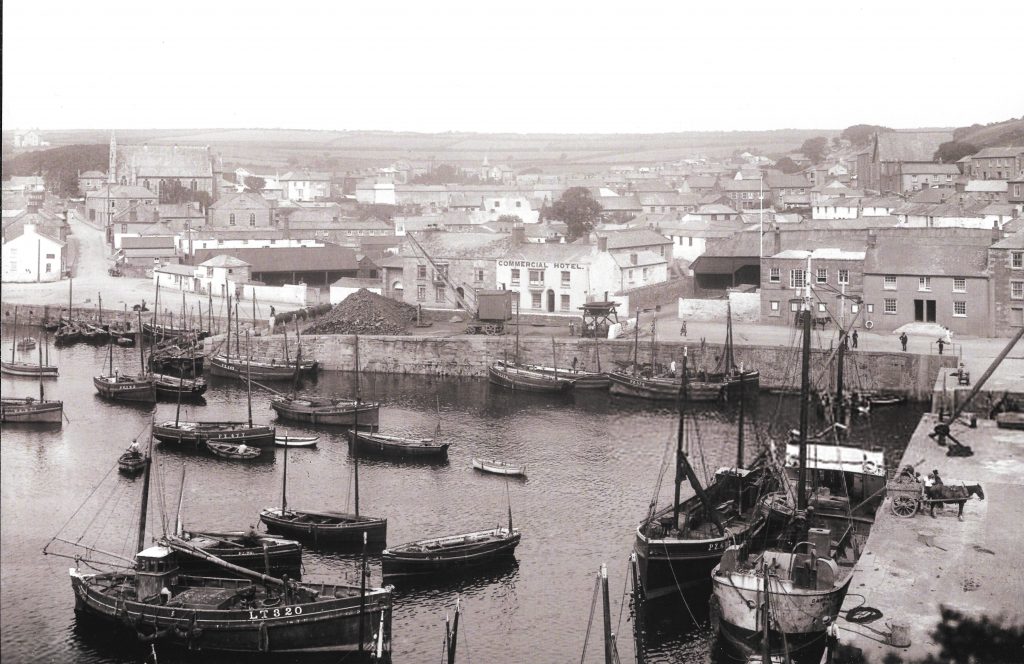
However, John checked on her Lowestoft credentials with his LT., friend Stanley Earl, who sent him the name Edith and Ethel !” Now the bells did start ringing. That boats’ name had family associations.
A further trawl of on-line newspaper references for ‘Edith and Ethel’, resulted in innumerable mis-hits, but with a bit of lateral thinking and selective filtering the following adverts were discovered, which revealed that by January 1919, she was motor powered, and appears to have been working out of Padstow.

Great Uncle Thomas Allen Pawlyn, of Sungarth Glynn-road, Padstow, held fishing interests in Padstow, but whether or not he was involved in the attempted sale of the Edith and Ethel, we don’t know. However, he and his brothers did own a number of Lowestoft registered trawl-smacks during the First World War, which were motorised in 1917. Whatever, LT.320 was advertised for sale again in the March.
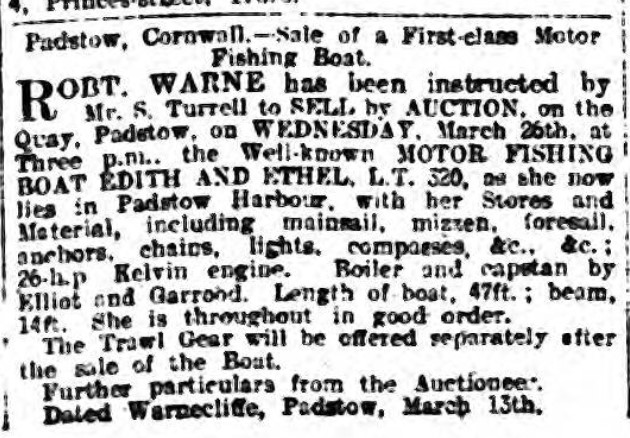
She was then sold to a Mr. Richards, of Newlyn, but no details of his ownership have yet come to light.
PADSTOW
On Wednesday week, Mr. R. Warne sold by auction (for Mr. S. Turrell, of Lowestoft) that well-known fishing boat the Edith and Ethel. There was considerable interest taken in the same, and the usual crowd attended. Bidding commenced at £500, and she was knocked down to Mr. Richards of Newlyn, at £685. The trawl gear, etc., offered immediately after realised good prices. [17]
Cornish Guardian, Friday, April 4th, 1919
Mr. Turrell’s interest in the boat is not known, but he may just have been a salesman acting as agent for the vendors. Later that year she was working the western waters. –
NEWLYN.
The motor fishing boats Our Katie, Edith and Ethel, Kingfisher, and Auld Lang Syne, left Newlyn on Monday for Padstow.[18]
Cornishman, Thursday, October 22nd, 1919
By an opportune cross-check with the Cornish Fishing Vessels Insurance Society (Ltd.), I find an even closer family connection with the Edith and Ethel, when my Grandfather Josiah, insured her for an undisclosed sum on May 27th, 1923. About that time, while still under Lowestoft registration, we find her pictured at moorings in Porthleven harbour.
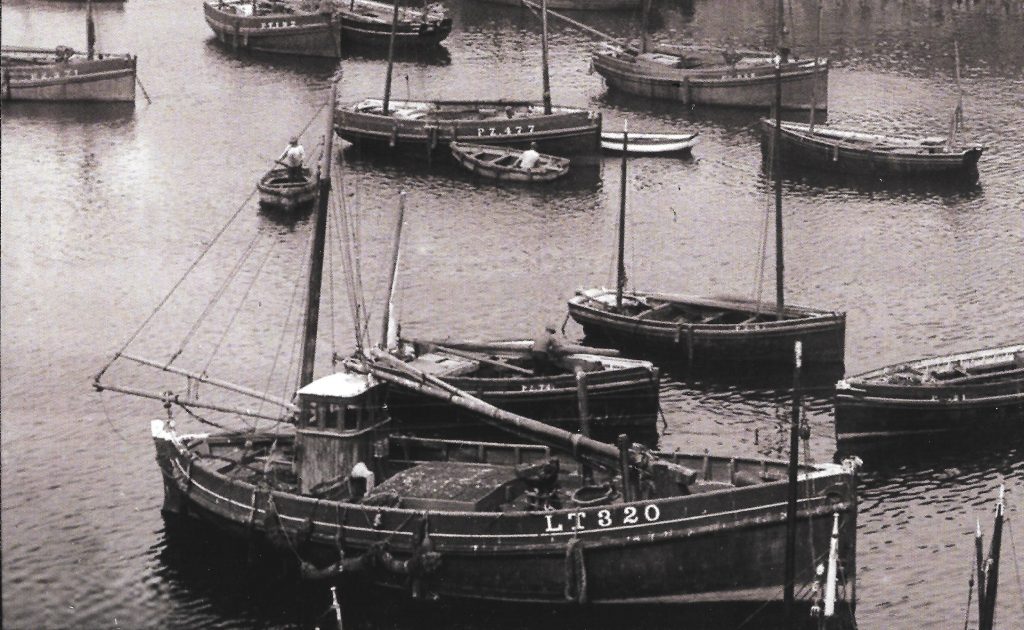
(Enlarged section : John McWilliams collection.)
On further enquiry of Stanley Earl, he informed John that ‘the only details I have is Built 1888; vessel at Lowestoft 1916 – 1924; 27 hp. Owned by E. Clack of Lowestoft & R. & J. Wilson of Hull in 1917. But he then went on to say that his records did have a photo of the Edith & Ethel as PH.14! [See below.]
A check of some family snap-shots of Porthleven, taken by cousins in the 1920s, turned up a similar shot of the harbour, and there she is in the bottom right, with her bows out of shot and her port number partially obscured.
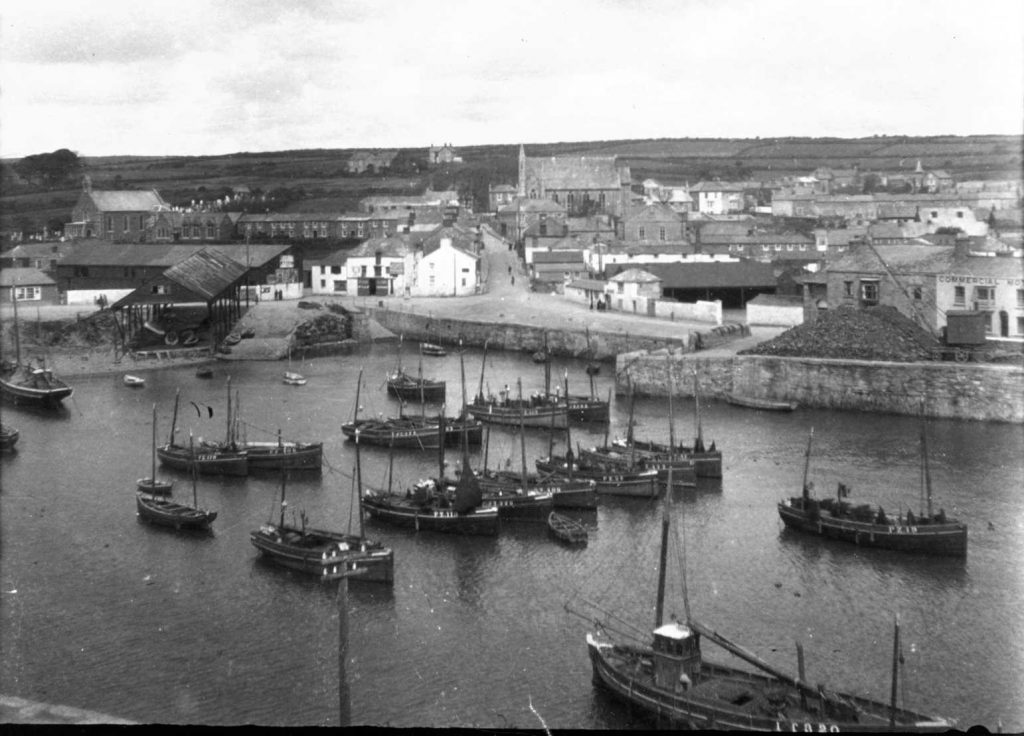
Yet again, in another very soft-focus shot of the harbour, she lies bottom right, further up the harbour between seasons, close to the Our Katie ~ PZ.697, centre left.
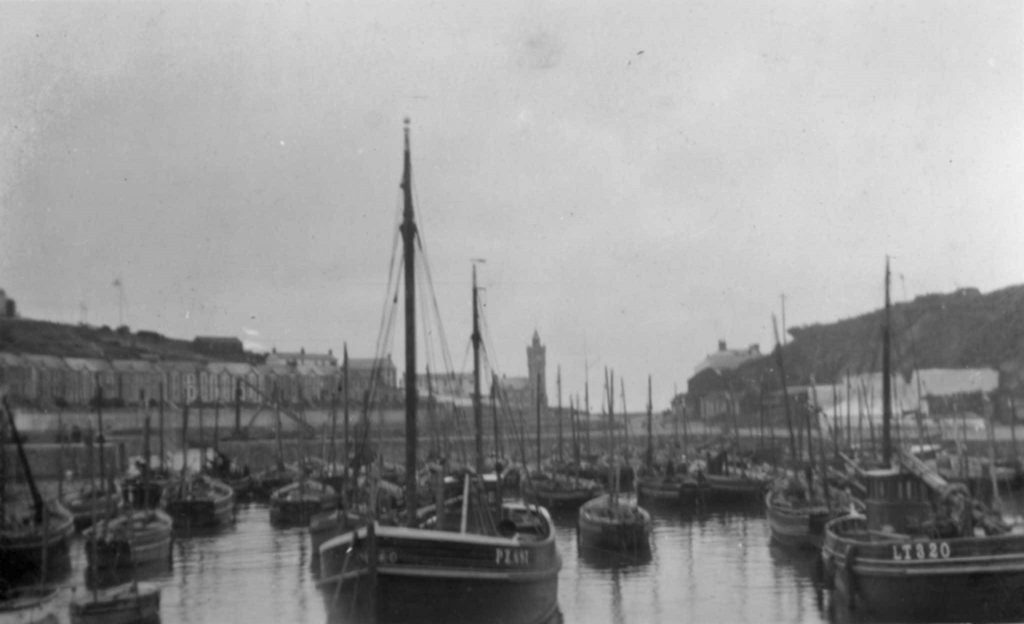
(Author’s collection)
From the location of these shots of the Edith and Ethel, it would appear that it was Great Uncle James Pawlyn, who lived in Porthleven, possibly had an interest in the boat. He certainly did in the Our Katie, as did my Grandfather Josiah, together with Richard Richards [Double Dick]; and perhaps he was the ‘Richards’ who bought the Edith and Ethel in 1919.
Whatever, we next hear of her working under Plymouth registration in the 1920s. I say hear of her, but in fact virtually all we have is a photo, and a couple of newspapers references. –
Edith & Ethel, PH.14
For many years my late friend Gary Hicks worked prodigiously on the Plymouth Shipping Registers, producing a remarkable record of these vessels and their owners in the form of a C/D., entitled Plymouth’s Other Fleet. For many of the bigger Class 1 fishing-boats, this is very informative, but the process was entirely dependent on the owners of these boats registering their craft as ‘British Vessels,’ as well as ‘Sea Fishing-Boats,’ which they did not have to do under contemporary regulations. Therefore, for the registration of any of these boats as Sea Fishing Boats, whatever class of boat they were, the Plymouth registers prior to 1936 have not survived, so for those boats registered before 1936 Gary was only able to record basic summary information from other National Archives.3 Thus, for the Edith and Ethel all we have is:
PH14 Edith & EthelA – 1924-1931 Class 1 (AM) 27 tons, date of first registry 14.2.1924. Trawl & nets, Crew 4 – ‘Registry closed vessel no longer used as a fishing boat. 4.12.1931.’
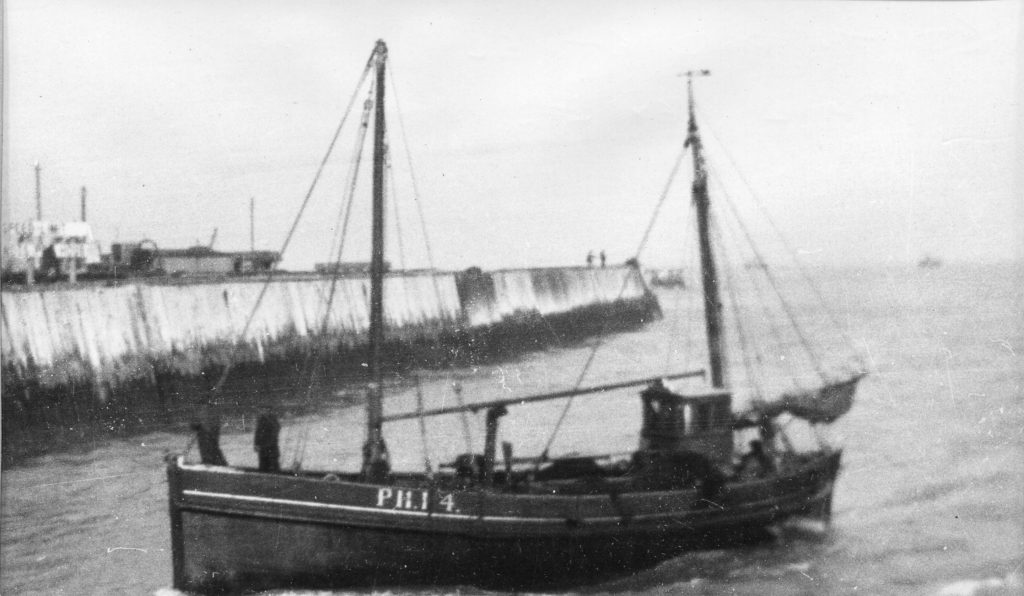
An on-line search revealed very few references to her at all during this period. And, as to her fishing, there was only one hit when, in January 1929, she was mentioned at the foot of a short report of Plymouth fish market landings and prices.
PLYMOUTH. – One steam trawler and half a dozen small motor trawlers landed supplies. Small hake made 35s a box; cod, from 7s to 8s each; pouting, 12s a box; whiting, 26s a box; merrrysoles, £1 per small box and 55s per large box; best soles, 10d per lb.; turbot, 50s to £3 per half-dozen rays, £8 10s a lot; lobsters, 1s 3d per lb. A Plymouth boat, the Edith and Ethel, landed 800 herrings, which made 8s per 100.
Western Morning News, Tuesday, January 29th, 1929
Then in September 1930, she was on the market once again. –
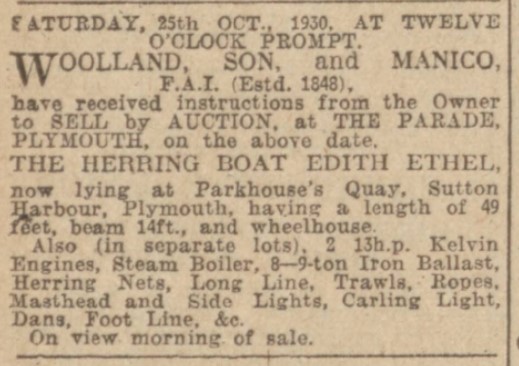
This or very similar worded adverts ran right up to the day of sale, but no reports of the sale itself have been found. She seems to have lingered on the Plymouth register for another fourteen months before this was cancelled, and her ultimate fate has yet to be discovered.
Was she broken up for scrap like so many boats of her age? Or did she become a yacht? Or perhaps a houseboat, or even a barge?
My sincere thanks to Stanley Earl, Lowestoft, and John McWilliams, St. Ives, for their invaluable contributions to later history of this boat.
Edith & Ethel’s – registered dimensions, under Penzance registration:
| 14/06/1888 | 17/07/1906 | |
| Length of Keel (ft.) | 49.2 | 46.0 |
| Length (ft.) | 48.6 | |
| Breadth (ft.) | 13.4 | |
| Depth (ft.) | 6.4 | |
| Tonnage – tons gross | 20.76 | 27.0 |
| Tonnage – net reg. | 20.76 | 27.0 |
| Number of crew – men | 6 | 6 |
| Number of crew – boys | 1 | – |
Tony Pawlyn
27 July 2022

